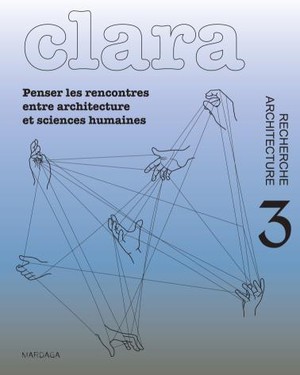Quand le pragmatisme est invité en architecture : une rencontre placée sous le signe de l’évidence
Contenu principal de l'article
Résumé
Prenant le thème du dossier au pied de la lettre, cet article fait l’histoire d’une rencontre donnée entre architecture et philosophie. La scène se situe à New York, en 2000, lorsque Joan Ockman prend l’initiative d’introduire la tradition philosophique américaine du Pragmatisme dans le champ de l’architecture. Elle met en place une série de dispositifs ambitieux afin que prenne cette rencontre inédite et risquée: un Reader réunissant des articles d’architectes et de philosophes pragmatistes autour de thèmes supposés communs, une assemblée transdisciplinaire réunie en panels ou en dialogue à l’occasion d’un workshop à Columbia University et d’une conférence au MoMA, et, finalement, la publication de certaines de ces contributions. L’échec relatif de cette série d’événements invite à interroger les conditions de réussite d’une telle rencontre. Pour ce faire, l’article propose d’abord de déplier les dispositifs mis en place avant d’entrer dans les arguments qu’ils ont permis de déployer. Le récit emprunte effectivement lui-même des méthodes et des critères pragmatistes: d’une part, l’artificialité de la rencontre est considérée comme une opportunité, d’autre part, son succès doit être mesuré à la lumière de ses conséquences. Finalement, ce sont des critères pragmatistes pour juger d’une bonne rencontre entre architecture et philosophie qui sont esquissés: cette scène et les discussions qui s’y manifestent amènent à envisager la reprise de pensées philosophiques par l’architecture comme relevant nécessairement d’une «trahison créative».
Details de l'article

Ce travail est disponible sous licence Creative Commons Attribution - Pas d'Utilisation Commerciale - Pas de Modification 4.0 International.
Références
ALLEN, S. 2012. «The future that is now: architectural education in North America, 1990-2012», dans J. Ockman (sous la dir. de), Architecture School: Three Centuries of Educating Architects in North America, Cambridge Massachusetts, MIT Press, p.203-229.
BAIRD, G. 2004. «“Criticality” and its discontents», Harvard Design Magazine, n°21, p.16-21.
BLAKE, C.N. 1995. «The perils of personality: Lewis Mumford and politics after liberalism», dans R. Hollinger; D.J. Depew (sous la dir. de), Pragmatism: from Progressivism to Postmodernism, Westport Connecticut, Praeger, p.88-106.
BLAKE, C.N. 2000. «Afterword: what’s pragmatism got to do with it?», dans J. Ockman (sous la dir. de), The Pragmatist Imagination. Thinking about «Things in the Making», New York, Princeton Architectural Press, p.266-271.
BROTT, S. 2010. «Deleuze and “The Intercessors”», Log, n° 18, p.135-151.
CUSSET, F. 2005. French Theory: Foucault, Derrida, Deleuze & Cie et les mutations de la vie intellectuelle aux États-Unis, Paris, La Découverte.
DAHMS, H.-J.; KRAUSSE, J. (sous la dir. de) 2001. «Neuer Pragmatismus in der Architektur», ARCH+, n° 156.
DELEUZE, G. 2003. «Lettre à un critique sévère», dans Pourparlers 1972-1990, Paris, Éditions de Minuit.
DICKSTEIN, M. 1998. The Revival of Pragmatism: New Essays on Social Thought, Law, and Culture, Durham, Duke University Press.
FERNÁNDEZ-GALIANO, L. (sous la dir. de) 2001. «Pragmatismo y Paisaje / Pragmatism and Landscape», AV Monographs, numéro spécial, n° 91.
JAMES, W. (1907) 2007. Le pragmatisme: un nouveau nom pour d’anciennes manières de penser, Paris, Flammarion.
MERKEL, J. 2001. «Talking about pragmatism», Oculus – the New York Chapter of the AIA, vol. 63, n° 6.
NOBEL, p.2001. «What pragmatism ain’t», Metropolis Magazine (juillet), Consultable: http://www.uky.edu/~eushe2/Pajares/jamesPragmatismAint.html [disponible le 22 avril 2014].
OCKMAN, J. 1997. «The road not taken: Alexander Dorner’s way beyond art», dans R.E. Somol (sous la dir. de), Autonomy and Ideology: Positioning an Avant-Garde in America, New York, Monicelli Press.
OCKMAN, J.; RILEY, T. 2000. Things in the Making: Contemporary Architecture and the Pragmatist Imagination, [cassette audio standard de 90 minutes], Sound Recordings of Museum-Related Events, 2001. 26a-27d, Museum of Modern Art – Museum Archives, New York.
OCKMAN, J. (sous la dir. de) 2000a. The Pragmatist Imagination. Thinking about «Things in the Making», New York, Princeton Architectural Press.
OCKMAN, J. (sous la dir. de) 2000b. The Pragmatist Imagination. Reader [brochure reliée], The Temple Hoyne Buell Center for American Architecture Records, Avery Architectural & Fine Arts Library – Columbia University, New York.
OCKMAN, J. 2000c. Letter to the Moderators [document dactylographié], The Temple Hoyne Buell Center for American Architecture Records, Avery Architectural & Fine Arts Library – Columbia University, New York.
OCKMAN, J. 2001. «What’s new about the “new” pragmatism and what does it have to do with architecture?», A+U,
n°9, p.26-28.
OCKMAN, J. 2013. Interviewée par Pauline Lefebvre, New York, 21 février 2013.
RAJCHMAN, J. 1998. «A new pragmatism?», dans C. Davidson (sous la dir. de), ANYhow, Cambridge Massachusetts, MIT Press.
RAJCHMAN, J.; WEST, C. 1985. Post-Analytic Philosophy, New York, Columbia University Press.
RORTY, R. 2001. «On the necessity of philosophy for the artist», ARCH+, n°156, p.44-47.
SPEAKS, M., 2000. «Which Way Avant-Garde ?», Assemblage, n°41, p.78
SPEAKS, M. 2002. «Design Intelligence and the New Economy», Architectural Record, n° 190, p.72–75.
STENGERS, I. 1997. Cosmopolitiques, VII: pour en finir avec la tolérance, Paris, La Découverte.
SYKES, K. 2010. Constructing a New Agenda: Architectural Theory 1993-2009, New York, Princeton Architectural Press.
WEST, C. 1989. The American Evasion of Philosophy: A Genealogy of Pragmatism, Madison Wisconsin, University of Wisconsin Press.
WEST, C. 1993. «Race and architecture», dans Keeping Faith: Philosophy and Race in America, New York, Routledge.
WEST, C. 1999. The Cornel West Reader, New York, Basic Civitas Books.
WEST, C.; KOOLHAAS R. 2001. «Critical mass: urban philosophies», AV Monographs, n° 91, p.15-33.

